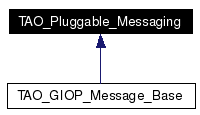
#include <Pluggable_Messaging.h>
Inheritance diagram for TAO_Pluggable_Messaging:

This interface tries to define generic methods that could be different messaging protocols
Definition at line 72 of file Pluggable_Messaging.h.
|
|
Dtor.
Definition at line 12 of file Pluggable_Messaging.cpp.
00013 {
00014 }
|
|
||||||||||||
|
Consolidate newly received fragment with previously arrived associated fragments to achieve consolidated message. All fragments having been received previously are being managed within implementation. If reliable transport is used (like TCP) this operation will be invoked with fragments being received partially ordered, last fragment being received last. Otherwise If un-reliable transport is used (like UDP) fragments may be received dis-ordered, and must be ordered before consolidation within implementation.
Implemented in TAO_GIOP_Message_Base. Referenced by TAO_Transport::consolidate_enqueue_message(), and TAO_Transport::consolidate_process_message(). |
|
||||||||||||
|
Check whether the node qd needs consolidation from incoming
Implemented in TAO_GIOP_Message_Base. Referenced by TAO_Transport::handle_input_parse_data(). |
|
|
Discard all fragments associated to request-id encoded in cancel_request. Transport implementaion guarantees that this operation will never be invoked // concurrently by multiplpe threads nor concurrently to consolidate_fragmented_message
Implemented in TAO_GIOP_Message_Base. Referenced by TAO_Transport::process_parsed_messages(). |
|
||||||||||||
|
Extract the details of the next message from the incoming through qd. Returns 0 if the message header could not be parsed completely, returns a 1 if the message header could be parsed completely and returns -1 on error. Implemented in TAO_GIOP_Message_Base. Referenced by TAO_Transport::handle_input_parse_extra_messages(). |
|
|
Format the message in the cdr. May not be needed in general. Implemented in TAO_GIOP_Message_Base. Referenced by TAO_Transport::format_queue_message(), and TAO_IIOP_Transport::send_message(). |
|
|
Fragment header length.
Implemented in TAO_GIOP_Message_Base. |
|
|
Outgoing GIOP message fragmentation strategy.
Implemented in TAO_GIOP_Message_Base. Referenced by TAO_ServerRequest::send_cached_reply(), and TAO_ServerRequest::tao_send_reply_exception(). |
|
||||||||||||||||
|
Generate a reply message with the exception ex.
Implemented in TAO_GIOP_Message_Base. Referenced by TAO_ServerRequest::tao_send_reply_exception(). |
|
||||||||||||
|
Implemented in TAO_GIOP_Message_Base. Referenced by TAO_On_Demand_Fragmentation_Strategy::fragment(). |
|
||||||||||||
|
Write the locate reply header The locate reply header is a part of any messaging protocol. The messaging protocol implementation would implement the way the locate reply header is written. Implemented in TAO_GIOP_Message_Base. |
|
||||||||||||||||
|
Write the RequestHeader in to the cdr stream.
Implemented in TAO_GIOP_Message_Base. Referenced by TAO_Transport::generate_locate_request(). |
|
||||||||||||
|
Write the reply header The reply header is a part of any messaging protocol. The messaging protocol implementation would implement the way the reply header is written. Implemented in TAO_GIOP_Message_Base. Referenced by TAO_ServerRequest::init_reply(), TAO_ServerRequest::send_cached_reply(), and TAO_ServerRequest::send_no_exception_reply(). |
|
||||||||||||||||
|
Write the RequestHeader in to the cdr stream. The underlying implementation of the mesaging should do the right thing. Implemented in TAO_GIOP_Message_Base. Referenced by TAO_Transport::generate_request_header(). |
|
|
Header length.
Implemented in TAO_GIOP_Message_Base. Referenced by TAO_Transport::allocate_partial_message_block(), and TAO_Transport::handle_input_parse_data(). |
|
||||||||||||
|
Do any initialisations that may be needed.
Implemented in TAO_GIOP_Message_Base. Referenced by TAO_IIOP_Transport::messaging_init(). |
|
|
Is the messaging object ready for processing BiDirectional request/response? Implemented in TAO_GIOP_Message_Base. Referenced by TAO_IIOP_Transport::generate_request_header(). |
|
|
Accessor for the output CDR stream.
Implemented in TAO_GIOP_Message_Base. Referenced by TAO_Transport::out_stream(). |
|
||||||||||||
|
Parse the details of the next message from the qd and initializes the other attributes of qd. Returns 0 if the message header could not be parsed completely, returns a 1 if the message header could be parsed completely and returns -1 on error. As the parsed data is stored directly in qd, no state must be stored in instance of implementation. Implemented in TAO_GIOP_Message_Base. Referenced by TAO_Transport::handle_input_parse_data(). |
|
||||||||||||
|
Parse the reply message that we received and return the reply information through reply_info Implemented in TAO_GIOP_Message_Base. Referenced by TAO_Transport::process_parsed_messages(). |
|
||||||||||||
|
Parse the request message, make an upcall and send the reply back to the "request initiator" Implemented in TAO_GIOP_Message_Base. Referenced by TAO_Transport::process_parsed_messages(). |
|
|
Reset the messaging the object.
Implemented in TAO_GIOP_Message_Base. Referenced by TAO_Transport::send_connection_closed_notifications_i(). |
 1.3.6
1.3.6